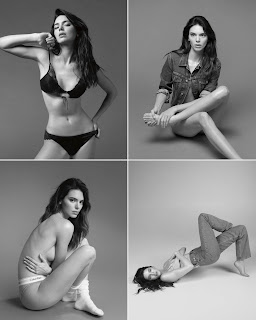Banning FKA Twigs’ Calvin Klein Campaign For “Objectifying Women” Is Really An Attempt to Undermine Black Women’s Empowerment
by Jess Clark
Unfortunately unsurprisingly, this week has seen a Calvin Klein ad featuring a black woman be banned in the UK at the same time as a similar shoot centred around a white man was prominently displayed at the Golden Globes.
Earlier this week the UK’s Advertising Standards Authority (ASA) banned a Calvin Klein campaign featuring FKA Twigs.
The shoot showed the singer wearing a denim shirt which revealed part of a butt cheek and some of one breast with the caption “Calvins or nothing.”
The ASA claimed that the ad was likely to “cause serious offence by objectifying women” because the “image’s composition places viewers’ focus on the models’ body rather than on the clothing brand being advertised.”
The ad regulator went on to argue that the emphasis on FKA Twigs’ body in the advert led her to be presented as a stereotypical sexual object.
The UK's decision to ban the Calvin Klein ad not only deprived her of showcasing her body and Klein's products but also attempted to strip away the empowerment the shoot provided. By banning it under the guise of sexism, what ASA have really done is attempt to make FKA fell like her choice was something disgusting and to be ashamed of.
While the decision to show or not show her body is nobodies decision but FKA Twigs, the irony of this decision during the same week where a similar Calvin Klein campaign, fronted by The Bear actor Jeremy Allen White, received a huge amount of praise.
Allen White was pictured stripped down to only Calvin Klein underwear, and subsequently went viral on social media.
Not only is he is arguably showing more skin than FKA Twigs in her advert, in a different form, but was actively reshared by the masses and even made multiple appearances at the Golden Globes at the beginning of the week.
Calvin Klein defended the ad by arguing that similar campaigns had been released in the UK, and stated that FKA Twigs had collaborated with, and approved the image before it was later published.
Two people had complained to the ASA that the images from the campaign were “overly sexualised” while similar images from the campaign featuring model Kendall Jenner were found to not have portrayed her as a “sexual object.”
In response to the ban of her advert, FKA Twigs suggested on Instagram that the ban, in contrast with the viral nature of Allen White’s campaign, demonstrated “double standards.” She also stated that she was “proud of the images” which she had produced alongside photographers Mert Alas and Marcus Piggot.
Both Calvin Klein and FKA Twigs were correct in their assessment that her adverts did not depart from current and past campaigns that the company has produced.
One famous Calvin’s ad featuring Kate Moss is similar to that of FKA Twigs, with minimal nudity and only a small part of the breast being photographed.
Furthermore, Calvin Klein is predominantly known in the public eye for their underwear, and it is incredibly difficult to advertise the product without it being shown off.
Some may also argue, in response to the ban, that the sexualisation of women’s bodies is part of the patriarchal standard, whereby women’s bodies, when skin is being shown, must always be viewed in a sexual light when this is clearly not the intention in the ad that the ASA has banned.
Like FKA Twigs discusses quite rightly when she says “I see a beautiful strong woman of colour whose incredible body has overcome more pain than you can imagine.”
Of course, there is the consensus that art and creativity is subjective, but when the model in the images makes it abundantly clear that she is happy with the images and has not been sexualised, the backlash against her is completely unjustified when considering the worship, and arguably sexualisation of his body, in his Calvin Klein adverts, without any ban at the same speed.
However, it is also important to acknowledge that the ASA have said that there have also been complaints about Jeremy Allen White’s adverts, so we wait to see if they will be banned in a similar manner to the FKA Twigs advert.
Edited by Emily Duff




